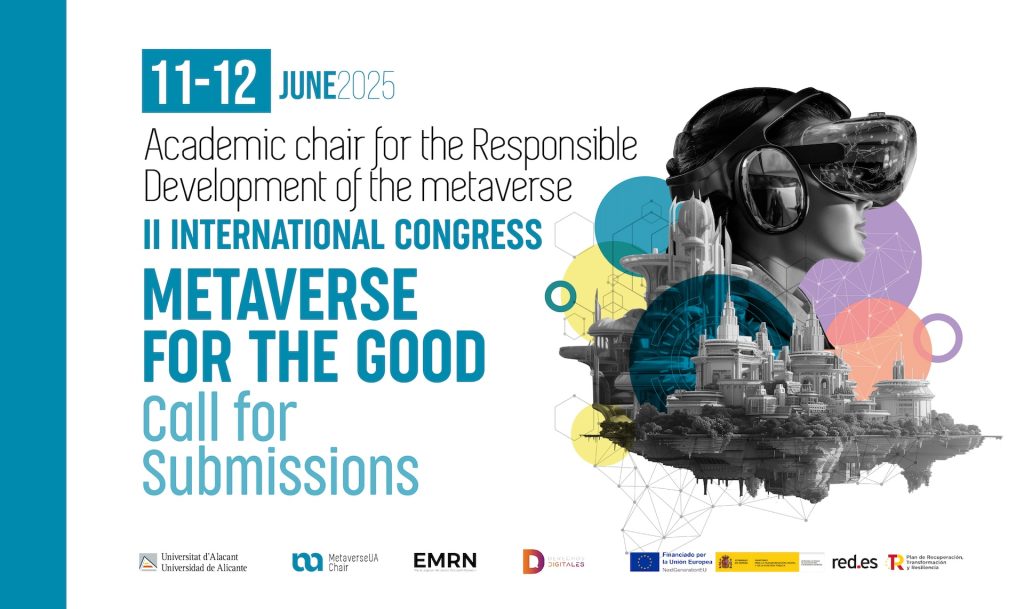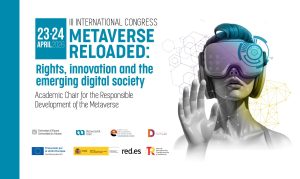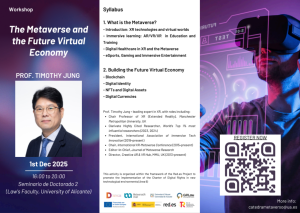
This newsletter edition has been elaborated by Malgorzata Wegrzak and Raúl Ruiz Rodríguez
The MetaverseUA Chair Newsletter #17 – March 2025
Hello there, Metaversian nerds!
Welcome to the latest edition of the MetaverseUA Chair Newsletter. Following our beloved monthly tradition, we are providing you with a new compilation of the latest news regarding virtual and augmented reality, as well as other emerging technologies that are contributing to the shaping of this brave new world! So, grab your VR headset and get ready, for exciting (or terrifying?) times are ahead!
Don’t they know…. it’s the end of the world the (Meta)verse…?
Our friends Inés and Giovanni already warned us in our previous newsletter… The buzz around the Metaverse seems to have quieted in recent months, and 2025 could be a year of refinement rather than revolution in the VR industry.
This slowdown has also made itself felt commercially, with Reality Labs—Meta’s division leading its AR and VR efforts—accumulating a staggering $21 billion in losses, underscoring the immense costs of pioneering this digital frontier. While skeptics question the financial viability and overall success (and honestly, who could blame them after the latest underwhelming Horizon Worlds promo?), Meta remains adamant that these investments will pay off, insisting that its user base continues to grow—though it remains conveniently tight-lipped on the actual numbers.
Only time will tell whether this gamble will redefine digital interaction or end up as an expensive lesson in overambition.

While the Metaverse Stalls, VR Finds a Second Chance Behind Bars
But even if Meta’s grand vision of the Metaverse is hitting some roadblocks, VR technology itself is far from dead. Instead of chasing virtual utopias, VR is finding its footing in more practical, real-world solutions.
Case in point: California prisons are testing VR as a tool to help inmates in solitary confinement reconnect with the outside world. The program, run by the non-profit Creative Acts, lets prisoners take immersive trips beyond their cells—whether that means strolling through a park, visiting new places, or even deep-sea diving.
The results? Fewer infractions, closed solitary units, and inmates saying they feel human again. Though some initially questioned whether VR belonged in prisons, advocates argue that when used the right way, it can be a powerful tool for emotional growth, reducing violence, and preparing inmates for life after release. Sure, VR might not have redefined digital socializing just yet, but perhaps it’s doing something even more important—offering a new kind of freedom, even in the most confined spaces.

or just another utopian step into madnes
Taste the Virtual: Scientists Cook Up a Flavorful Future for VR
Ever wished you could actually taste the food in a video game or a VR cooking class? Scientists might have just made that dream a reality. A new «e-Taste» device can recreate flavors on your tongue using an electronic system that mimics sweetness, saltiness, sourness, bitterness, and umami. By analyzing real foods and delivering taste sensations through tiny pumps, this tech could add a whole new layer of immersion to gaming, online shopping, and even remote culinary education.
Of course, it’s not perfect—spiciness and fattiness are still off the menu—but it’s a tantalizing step toward making the digital world more delicious. Who knows? Maybe one day, tasting a virtual burger won’t leave you craving the real thing.

on the safe side for the time being
The IBA Takes on the Metaverse—One Regulation at a Time!
If you thought navigating the Metaverse was complex, wait until you see the legal maze that comes with it. The International Bar Association (IBA) has just released Digital Regulations in the Metaverse Era, a guide that unpacks the ever-evolving legal landscape of virtual worlds. And it’s not just a broad-strokes analysis—this publication dives deep into specific regulatory challenges across different countries and regions.
So, whether you’re worried about how your avatar’s virtual property is protected in Europe or if digital identity laws in Asia might affect your next Metaverse venture, this report has you covered.
Curious? Take a look at the full publication here.

Spain Hits 'Delete'—But Does It Really Work?
The Spanish Data Protection Agency (AEPD) is joining a Europe-wide mission to answer a tricky question: when you ask for your data to be erased, does it really disappear? As part of the European Data Protection Board’s 2025 action plan, 32 data protection authorities will spend the year investigating whether organizations properly respect the right to erasure under Article 17 of the GDPR. The AEPD will dig into how companies and public bodies handle deletion requests, identifying best practices, common slip-ups, and whether stricter enforcement is needed. A final report will offer a big-picture view of compliance across Europe.
The results of this initiative could have important implications for virtual reality environments. As we’ve discussed in several of our papers, the right to erasure becomes particularly complex in the Metaverse, whose persistent and interoperable nature makes deletion a legal and technical challenge—especially in decentralized virtual worlds, where accountability and enforcement are even trickier. We’ll be keeping a close eye on this to keep you updated!

on data
Upcoming Events You Won’t Want to Miss!
- ICVR 2025 (9-11 July, Wageningen, Netherlands) – A top global conference on VR, AR, and XR, bringing together researchers and industry leaders to explore cutting-edge advancements.
- AWE 2025 (10-12 June, Long Beach, CA) – The world’s leading XR event, featuring talks on AI, gaming, enterprise applications, and the future of immersive tech.
- AI & Metaverse Innovate Summit 2025 (17-18 April, Virtual) – A deep dive into AI’s role in the metaverse, digital business, and ethical challenges ahead.
And sure, all these events will offer valuable opportunities to engage with the latest developments in XR technologies and the Metaverse…
… but speaking of great things, have I mentioned mine?
Indeed, as already announced, we have a very special event of our own!

The II International Congress: Metaverse for the Good will take place on June 11-12 at the University of Alicante (Spain) organized in collaboration with the European Metaverse Research Network in the framework of the Project on the Implementation of the Charter of Digital Rights financed by the public entity Red.es.
This congress will explore how AI and the Metaverse intersect to shape the future, from AI-driven avatars to ethical challenges in virtual spaces.
- The Call for Submissions is now open for papers, posters and tutorials covering AI-driven programming, virtual world agents, and applications in entertainment, healthcare, business, and beyond.
- Submission Deadline: April 18, 2025
And if you have a few minutes to spare and you live in Spain or work for a Spanish entity, we would love you to take part in our public consultation on emerging technologies, where your insights—whether from a professional perspective or simply as an interested observer—will help shape the conversation on the future of the Metaverse. Your opinion counts! Share your thoughts here.
Ctrl+Alt+Goodbye!
And that’s a wrap on this edition of our beloved newsletter. Whether you’re exploring virtual worlds, debating AI ethics, or just here for the latest XR gossip, we’re grateful to have you with us on this journey. Stay curious, stay connected, and we’ll be back soon with more insights, news, and maybe a few shameless plugs. Until next time—see you in the Metaverse!
Malgorzata Wegrzak
Raúl Ruiz Rodríguez
Últimas noticias y eventos
-
 01 Dic 2025 NewsCall for Papers - III International Congress of the MetaverseUA Chair: “Metaverse Reloaded: Rights, Innovation and the Emerging Digital Society”” University of Alicante, 23-24 April 2026
01 Dic 2025 NewsCall for Papers - III International Congress of the MetaverseUA Chair: “Metaverse Reloaded: Rights, Innovation and the Emerging Digital Society”” University of Alicante, 23-24 April 2026 -
 25 Nov 2025 NewsNew Workshop | The Metaverse and the Future Virtual Economy, by Prof. Timothy Jung
25 Nov 2025 NewsNew Workshop | The Metaverse and the Future Virtual Economy, by Prof. Timothy Jung -
 14 Nov 2025 NewsMetaverseUA Chair Newsletter #22 – November 2025
14 Nov 2025 NewsMetaverseUA Chair Newsletter #22 – November 2025


